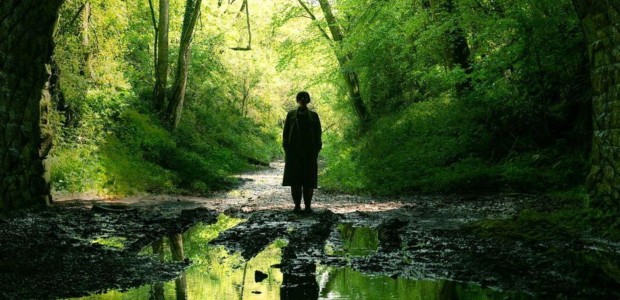When we first meet Harper Marlowe (Jessie Buckley) in MEN, she’s arriving at a rural English villa, where she spots an apple tree. In a moment loaded with obvious symbolic portent, she plucks an apple and takes a bite, something she mentions offhand later on, when groundskeeper Geoffrey (Rory Kinnear) is giving her a tour of her vacation home. “Mustn’t do that,” he replies with a stern gaze. “Forbidden fruit,” he says before cracking a smile and reassuring Harper that he’s just joking. But because this is an Alex Garland picture, we know it isn’t a joke but an actual harbinger of doom: to be a woman in his works is to often confront horror, some fashioned by men, others occurring more naturally. By invoking the Biblical story of Eve, MEN suggests the latter, that the horrors of being a woman are inherent and primal, the wages of the original sin of unleashing horror into the world in the first place. It’s not just the foreboding, deceptively lush landscapes of Garland’s work where this condemnation dwells: these horrors are everywhere, intertwined in our folklore, embedded in our cultural consciousness, maybe even woven into the starry fabric of the universe. Even if we laugh them off, we know, deep down, they lurk, waiting to surface.
MEN explicitly concerns itself with the way these horrors can never be truly repressed. We learn that Harper’s countryside sabbatical is an act of repression, a therapeutic getaway that will hopefully allow her a reprieve from grieving her husband James (Paapa Essiedu), who recently died by plunging from their rooftop. Harper’s traumatic memory of the event—she saw James falling through the window and wants to believe she locked eyes with him one last time—intrudes upon her tranquility though, violently jolting her back to reality. Flashbacks reveal more details, particularly the revelation that this was an unhappy marriage marked by physical abuse and manipulation. Upon reaching her breaking point, Harper asked for a divorce, only for James to insist that he’ll kill himself in response. And, then, sometime shortly thereafter, he seemed to do just that, and she still can’t shake the image of his impaled body grotesquely contorted on the wrought iron gate below their flat. She’s not entirely sure of these events, though, as her upstairs neighbors claim he was simply using their balcony to make his way back down into his own apartment. James may have simply slipped to his horrific fate, leaving Harper unable to ever truly know the truth.
But these memories may be the least of her worries because her idyllic getaway soon grows into an ominous ordeal when a naked, masked man (also played by Kinnear) begins haunting the place. She first spies him on an otherwise uneventful walk into the countryside and dismisses his presence as odd but innocuous; it’s not until he tries breaking into the house that she’s jolted into realizing that something is amiss here.
That’s immediately obvious to the audience. Again, Garland’s reputation does precede him, but his ability to instantly transform this bucolic retreat into a crucible of nervy terror is striking. Much like Ben Wheatley did last year with IN THE EARTH, he finds an unnerving eeriness in the rural, sodden countryside. Assisted by Ben Salisbury and Geoff Barrow’s evocative choral score, Garland and DP Rob Hardy turn a stroll into these deep, dark woods into a harrowing affair through sheer suggestion. The landscape teems with a vague, dank menace that especially takes hold when Garland punctuates the ethereal score with unsettling patches of still silence. Harper’s walk brings her to a nearby tunnel, where her voice echoes off into the distance, reinforcing the utter desolation of this place. A shot capturing her enveloped in darkness, accompanied only by the sound of her increasingly distant voice, further entrenches her into the void, secluding her from the world—which is what makes the first sight of her nude stalker, who emerges at the other end of the tunnel—so ghastly.
It’s the stuff of obvious, primal horror: nothing is quite as unsettling as discovering you are, in fact, not as alone as you assume. This kind of sparse, elemental horror has become a calling card for distributor A24, something that’s noteworthy because Garland leans into this house style almost to the point of parody: the deliberate pacing, the meticulous lensing, the ominous zooms, the subtle jolts. You might expect someone with Garland’s chops to be a little bit more inventive here, but he’s mostly content to play the stylistic hits, so MEN takes on that je-ne-sais-quois tenor of “elevated horror,” where atmosphere, mood, and craftsmanship reign in place of cheap jolts and schlock.
Pointedly, the dread doesn’t ease when Harper contacts the authorities. Even though the police apprehend her stalker, she continues to encounter more men, each of them unsettling in their own way. A vicar’s initial warmth and kindness cool into presumptuous judgment when he insists Harper should harbor guilt over James’ death. A young man’s innocent playfulness warps into frustrated entitlement when she refuses to play a game with him. A cop’s reassurances ring hollow as he reveals her stalker was freed because he’s likely harmless and didn’t do anything wrong in the first place. Even Geoffrey’s presence grows irksome when even his geniality becomes vaguely off-putting, almost to the point of phoniness. Together, this symphony of men harmonizes into a familiar refrain of the patriarchy’s greatest hits, contorting the situation in such a way to reframe the various men in Harper’s life as victims. Her concerns become trifles, dismissed as the paranoia of a hysterical woman, reinforcing the thuddingly obvious mantra of MEN: the patriarchy will always look out for itself and victimize women at every turn.
To his credit, Garland explores this obvious, almost trite theme unconventionally. Kinnear plays all of the men, including the young kid, an uncanny sight that isn’t convincing but isn’t supposed to be, a bellwether for Garland’s matter-of-fact treatment of this hook. Something is obviously amiss, yet it goes unremarked upon, signaling the blatant symbolism at hand: these men all have the same face because all men are united in their misogynistic complicity. Kinnear takes on these multiple roles in stride, treating them less as a flashy actor’s showcase and more of an opportunity to craft a singular performance by threading a faintly perceptible animus through the various men. It’s a nicely understated turn that allows the film to quietly simmer with menace before its various grotesqueries erupt during the climax.
Buckley matches Kinnear with a similar restraint, painting the portrait of a woman whose welled-up grief surfaces in bursts. Garland’s script doesn’t provide much interiority for Harper, a woman we mostly come to know through scattered flashbacks and Skype conversations with her friend (Gayle Rankin, providing a touch of levity), allowing Buckley’s resolute presence to further sketch the character into something compelling. Perhaps the most interesting choice here is how she’s been directed to react to the increasingly bizarre events unfolding around her character: she doesn’t acknowledge that she’s being haunted by the same face, nor does she seem to be particularly aghast at the gory theatrics that unfold before her during the climax. Whether this is meant to capture her resignation or to accentuate the film’s allegorical underpinning is hard to say, mostly because MEN becomes even more unmoored from reality down the stretch.
I don’t know that it qualifies as a hard left turn, just because MEN is off-kilter throughout. However, something about the transition to the climax’s pure abstraction, which suggests that these horrors are simply the way of the world, begotten ad infinitum and replicated in perpetuity, feels abrupt and jarring in the service of Garland’s obvious, literal-minded messaging. For much of the runtime, it’s hard to miss what’s on his mind here, particularly since he pilfers familiar misogynist sound bites to give an utterly familiar, banal shape to these gendered horrors. When he resorts to body horror freak-outs and a laconic coda, it feels like an odd attempt to retroactively obscure what was and remains obvious by the end of the film: dudes do not, in fact, rock. It’s an odd choice, but one that’s easy to respect because it is such a pronounced choice: MEN gets very weird in a genuinely disorienting way, as Garland indulges himself, allowing each climactic scene to linger a beat longer than necessary as he repeats one particular gag to the point of coaxing uneasy laughter. Maybe that’s intentional, maybe it isn’t—I’ve spent a couple of days processing exactly what Garland is going for during the past ten minutes or so especially.
I still don’t know if I have an answer—and that’s okay! For whatever reason, we critics especially feel compelled to have a take, sometimes an instantaneous one, and I can’t think of a more obvious disservice to art. Sometimes, you’re confronted by something like MEN that resists knee-jerk reactions, leaving you to wonder if you’re indifferent to or simply puzzled over a strange paradox of a movie that’s straightforward and obtuse all at once. Garland’s musings on toxic masculinity seem easy enough to parse, yet he embellishes them with folk horror flourishes and symbolic abstractions that do just enough to create the impression that you might be missing something more.
Maybe this is just an “Emperor’s New Clothes” situation and I simply have to believe that Garland has laced the film with further brilliance that lurks somewhere within his various allusions (in addition to Genesis, he frequently invokes the pagan “Green Man,” a fertility figure whose image foreshadows the film’s wild climax). Maybe MEN is exactly the type of movie that demands a revisit. If we’re being honest, this is probably true of more movies than we’d like to admit, so I’m going to take this opportunity to punt on detailing exactly how I feel about MEN because I’m still not quite sure. Maybe we’re meant to be like Harper herself: gazing into the void, unable to know the truth beyond the sheer, undeniable horrors that have plagued the Earth since men began to roam it and craft stories about wicked women. Maybe MEN is Garland’s apologia, an obvious act of penance that points the finger back. The only thing I can say for sure is that it’s beguiling in a way few films are, especially ones that play in multiplex theaters, and I’ll take that instead of the easily-digestible, pandering fare that typically comes down that pipeline.



No Comments